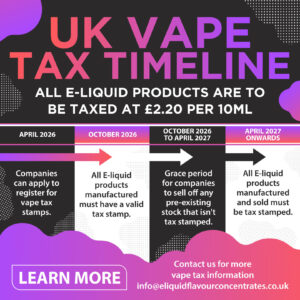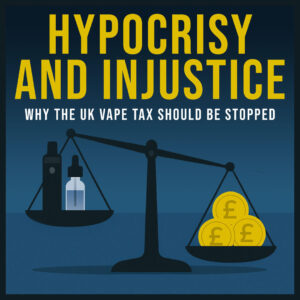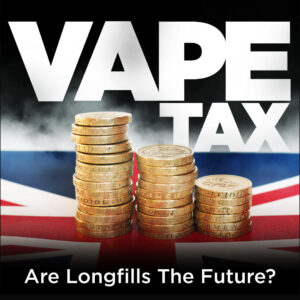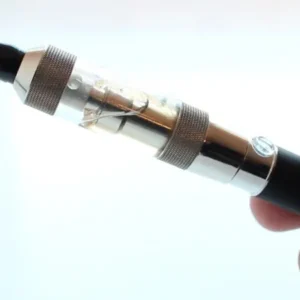10% OFF Your Order Today - Use the code WELCOME10
Hypocrisy and Injustice – Why the UK vape tax should be stopped
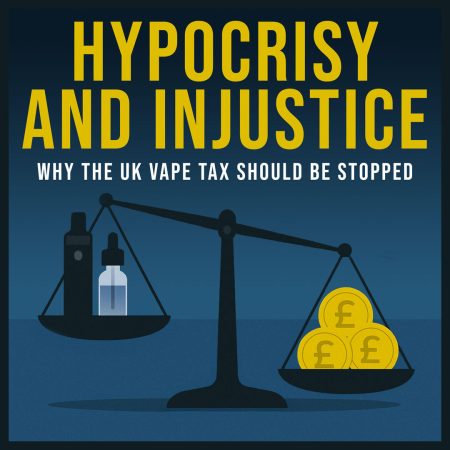
Hypocrisy and Injustice – Why the UK vape tax should be stopped
30/07/2025
In case you were unaware, the UK government is planning to introduce a vape tax of £2.20 per 10ml of e liquid from October 1st 2026. It’s expected that VAT will be added to that figure, which means the actual price increase for vapers in the UK will be £2.64 for 10ml, or £15.84 for 60ml.
Despite various scare stories in the media about vaping, many of which have nothing to do with legal nicotine vapes (here’s looking at you USA cannabis vape cart scandal of 2019), it’s widely accepted in the medical and scientific community that nicotine vapes are much safer than smoking traditional tobacco cigarettes. In fact, here in the UK, the MHRA states that vaping is at least 95% safer than smoking.
In this article we take a look at why the UK vape tax is not only bad for consumers, but may also backfire for those who are implementing it.
Health:
Let’s start with the obvious one – public health. As stated, it’s accepted by both medical professionals and the government that vaping is much safer than smoking tobacco cigarettes. So much so that there are plans by some NHS trusts to offer vapes on prescription to current smokers looking to quit.
Smoking tobacco is still the number one cause of preventable deaths in the UK. The most recent data estimates that 78,000 early deaths per year are caused by it. These deaths, along with treatment for smoking related illnesses, not only cause societal harm but they also cost the NHS an absolute fortune. If you consider things like loss of productivity and other economic costs alongside the cost of medical treatment, it’s estimated that smoking costs the UK around £13 billion a year.
With early estimates suggesting that the vape tax will bring in around £600 million a year to the treasury, even a small percentage of smokers being put off by the higher cost of vaping or a small percentage of current vapers turning back to smoking, that increase in treasury income could be wiped out by the societal and medical costs of tobacco harm.
Jobs and the Economy:
When vaping first exploded in the UK, there were lots of new companies forming to meet customer demand. Everything from vape liquid and hardware manufacturing to retail, importation, regulation and distribution is done by UK companies. Although things have since settled down, the UK vaping industry still employs a whole lot of people, many of whom are entrepreneurs and job creators.
The UK vape industry took a hit a few years ago with the rise in cheap Chinese disposables, but the vape tax is likely to hurt the industry far more. It’s widely believed that the tax will force many small manufacturers to close their doors permanently. The investment required to produce e liquid under the new rules (tax stamps, nicotine tracing, compliance costs etc.) will be far too much for many smaller companies.
Much like tobacco, we could end up in a place where vaping in the UK is run almost exclusively by a handful of very big companies. Just recently Japan Tobacco International bought a controlling stake in one of the largest UK e liquid manufacturers and distributors, which shows that this is a very real possibility.
Small and medium companies in the UK employ around 60% of the total private sector workforce, so job losses in SMEs mean less revenue for the treasury.
A Rise in the Black Market:
The black market, by definition, doesn’t release sales figures, but some estimate that almost a third of all vape sales in the UK happen illegally. In many cases, VAT isn’t even paid on these sales so the treasury isn’t receiving any income at all.
Illegal vapes, usually imported from China, are still widely available in the UK despite the disposables ban. The vape tax will significantly increase the cost of vape liquid, so it’s only logical to conclude that the black market for vapes will grow, further cutting into the predicted vape tax revenue.
Cost of Living:
“Cost of living crisis” is a term I’m sure you’ve heard a lot over the past few years. Due to things such as supply chain disruption during the pandemic, energy cost hikes resulting from Russia’s invasion of Ukraine and the threats of cross-boarder tariffs, inflation has been higher than wages for most of the decade.
Understandably, this is an issue high on the agenda for most politicians. After all, people tend not to vote for you again if they’re poorer than when you took office. £2.20 per 10ml of e liquid may not sound like much in the grand scheme of things, but if you vape 20ml of e liquid a week, that’s an additional £228.80 per year (more if VAT is added on top of that).
Trust:
It’s often said that we live in a post truth world, where the information we see online and on social media is either distorted to suit the publisher and their agenda, is paid for by those who want to discredit others or is flat-out untrue.
Politicians understand this, and in a world where perception is more important than fact and outside interference is growing, it’s not a good look to hike taxes on those who are looking to make the positive switch from smoking to vaping.
In the eyes of voters who vape, or who want to vape, a sin-tax on a product such as vaping could easily be seen as both counterintuitive and hypocritical.
Summary:
The UK vape tax is currently going through the legislative process, so it’s going to be difficult to stop. However, we urge you to contact your local MP to let them know that you think this is a bad idea.
It’s clear that this tax will not only cause millions of UK vapers to become poorer, but may also backfire from a financial perspective.
If you have any questions about the UK vape tax, feel free to get in touch.

